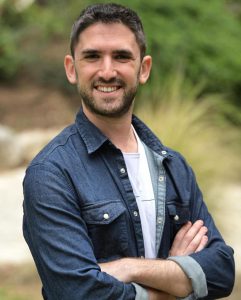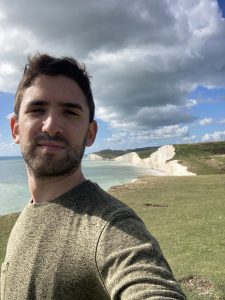Alon Teshuva (26) is a third-year student at the Faculty of Law at the Hebrew University in Jerusalem, who is currently in London as part of an international programme CTLS, The Center for Transnational Legal Studies in London. Alongside students from 14 law faculties around the world, the programme includes 12 law students from the Hebrew University. One of the programme’s co-directors is Professor Yuval Shany, an expert in public international law, human rights and humanitarian law, and a former dean of the Faculty of Law at the Hebrew University.
Alon arrived in London in mid-August, and “even before the war, on the first day, we were told that there are differences in perception among the students that we might encounter, and we need to know how to deal with it. No one could have imagined that in just two months, we would be dealing with a war in Israel. I estimate that there are students studying with me whose attitudes towards Israel are complex, but thankfully, they do not express as in other institutions in the UK or in the world in general.”
How does an Israeli student abroad feel during a war at home? How has the university supported Israeli students on campus? And what’s the most effective form of advocacy during such times? Read the interview to find out:
Tell us about that “Black Shabbat” as you experienced it in London
“In the army, I served as a military correspondent in the Spokesperson Unit of the IDF, and as part of the role, we were taught to always be alert. Ever since, even four years since I was discharged, every time I wake up during the night I immediately check my phone. It’s something I can’t disconnect from.
That black morning, I woke up at 5:30 London time, opened my phone, and saw a red alert (missiles alert) that, unfortunately, is not unusual. But when I scrolled down and saw a report about a terrorist invasion, I understood that something serious is happening. I immediately got up, turned on my computer, and was shocked. I still didn’t fully grasp that I was experiencing it from abroad. I think I began to understand the contrast between how life here continues and what’s happening in Israel when I felt the dissonance. I will never forget the conversation with my family while I was in Zara where background music was played, unlike the ‘background music’ my family heard when the names of the victims were displayed on their TV screen. You can liken it to a sense of personal loss. When someone close passes away, the world continues as usual, but the shock is so deep for you. In Israel, everyone knows everyone, if not in the first circle, then in the second.”
On the following Monday, when you returned to your studies, did you feel an expectation to behave in a certain way?
“During the first week, I couldn’t get out of bed because of the shock. My entire routine came to a halt. I even struggled to prepare a simple meal for myself to the point where I gave up trying. Fortunately, the programme I’m participating in is like a warm cocoon, the staff are very supportive and accommodating, foreign students approached us, hugged us, asked questions out of a desire to understand and help us, and it was touching. The student association organised a solidarity meal in our honour, and forty out of eighty people came to show empathy in their own way. The ability to demonstrate such solidarity is not trivial in a foreign university outside of Israel.
“There are WhatsApp groups of Israeli students in London, where, apart from being Israeli students in London expressing empathy towards each other, we don’t have a personal connection. There, I was exposed to difficult things happening in other universities and colleges. Just a few days ago, the UCL UCU academics voted for “Intifada until victory” and a “mass uprising” against Israeli civilians. Fortunately, it’s not something I have to deal with in my programme, and I think if I did, I wouldn’t have stayed in London.”

Why do you think it’s different at your place?
“I think it’s different because one of the co-directors is Professor Yuval Shany, and it involves policy guidance. Most of our environment is quite receptive, but I’m sure there are some who think differently, and that’s okay. This is due to lack of knowledge and information. I’m not looking to confront people, but I’m engaged in advocacy. As a former military correspondent, I learned that one of the essential things is the personal aspect. It helps people to identify with you, and I know that some people changed their minds after talking to me. Students who studied with me shared what they thought they knew: that Israel is violent, occupying land that doesn’t belong to it, and displacing the Palestinian people from their land. So, I talked to them about the United Nations Partition Plan for Palestine, the UN Resolution 181, the Balfour Declaration, and to support all of this, as a law student, I showed them sources and documents and discussed the Israeli ethos. Suddenly, people changed their minds, understood that they had been educated on one narrative that isn’t necessarily the truth.
“One thing that moved me was when a very close friend in the programme explicitly told me that she had changed her mind completely towards Israel, that she writes pro-Israeli posts on social media in her native language, and following her, her family also changed their views. However, she shared with me the challenge she faces on social media; there are many more pro-Palestinian posts than pro-Israel posts, and it’s difficult for her to share pro-Israel content because then friends and many people she knows criticise her. It’s a challenge I never thought about; how do pro-Israelis deal with it, and that’s why many of them prefer not to share anything. It’s understandable.
“In my view, the best advocacy is influence through personal and authentic connections, not through discussions on social media. The moment people meet someone they know, see the face, are exposed to their emotions, the communication is much better and that’s how I manage to bring about change. It comes from a place of collaboration, not from a place of explanation, and that’s how I find a listening ear”.
Has CTLS made it easier for you?
“Certainly, some of the Israeli students were called up for reserve duty, and some returned to Israel because they couldn’t stay abroad while the country was in turmoil. Our study centre is very considerate and has shown high flexibility. They offered us extensions for home exams and task submissions, the attendance in classes is important but they also assured us they would help us catch up if we needed to miss classes. Since I need routine and stability, I kept attending classes even when my focus was lost. It was also important for me to meet my foreign friends who, in some escapist way, were quite helpful. Each of the Israelis has a different way of coping, and my way is to be with people who help me forget the troubles I have at home, even if for short periods. Additionally, my partner told me that people in Israel are starting to return to their regular activities, so I should continue with my studies here.
“What makes it difficult is the distance from my family. My family lives in Kiryat Motzkin in the north, and I am very close to my parents. When rockets were fired towards the northern area, I felt that it was starting to shake me. I also train at a Karate club that serves as my ‘second family’, and I believe that if I were in Israel, I could rely on them too. However, I see myself as a strong person, sometimes there are setbacks and nothing can be done, but in the end, in just a month and a half, I’ll be back home”.

So how do you cope with the difficulty and the distance from your family?
“It’s difficult for me being here and not in Israel. If I were in Israel, I would volunteer with the hostages and missing families forum. So I looked for ways to help from here, and when Prof Shany asked who among the students wants to help at the Human Rights Clinic, I immediately joined. In the past, I was a member of a human rights blog at The Minerva Center for Human Rights at the Hebrew University of Jerusalem’s Faculty of Law, to which I contributed two articles, and this semester, I’m studying international human rights law. Sometimes I receive tasks from Prof. Yael Ronen, a research fellow who manages the blog, and I assist in writing responses to questions from an international audience, such as the definition of a prisoner of war and the Geneva Conventions. I conduct research, request information about the missing and prisoners of war, and try to understand their rights and what we can demand. I try to do what I can from here, and I have no doubt that if the war continues when I return to Israel, I will contribute to this effort in one way or another”.
And how do you feel today, almost a month after the outbreak of the war?
“This is a tricky question because everything can change any minute. On social media, I’ve been exposed to reports of anti-Semitic incidents happening in the UK, but I haven’t personally encountered them. I avoid areas with pro-Palestinian demonstrations. I mainly stay on the route between home and the university, which are only 15 minutes apart, but incidents like the Tube driver who led a chant of ‘free Palestine’ or attacks on Jews make me feel apprehensive about being outside. I don’t wear Israeli or Jewish symbols, and I try not to speak Hebrew on the streets or be alone, but I admit that I’m becoming frightened, a fear I didn’t have before the war, and I didn’t think I’d have to deal with it here.
“Before I came here, I wanted a break from the political conflict in Israel and to breathe a different air, but now I’ve gained a different perspective. I can’t stop thinking about Israel. I’m so connected to my country and my people, and I didn’t fully realise it before. I worry about my friends in Israel and look forward to the moment we can return to our local pub as we used to do at the end of each semester”.





























